UK economy almost stalled in February even before Ukraine war
Are we headed for Stagflation? UK economy almost stalled in February even before Ukraine war with GDP up just 0.1% as inflation spikes towards double-digits
UK economy almost stalled in February with growth coming in at just 1 per centExperts warned there is likely to be prolonged period of weak GDP performanceInflation predicted to keep rising in coming months potentially to double digits
<!–
<!–
<!–<!–
<!–
(function (src, d, tag){
var s = d.createElement(tag), prev = d.getElementsByTagName(tag)[0];
s.src = src;
prev.parentNode.insertBefore(s, prev);
}(“https://www.dailymail.co.uk/static/gunther/1.17.0/async_bundle- -.js”, document, “script”));
<!–
DM.loadCSS(“https://www.dailymail.co.uk/static/gunther/gunther-2159/video_bundle- -.css”);
<!–
Stagflation fears were underlined today as it emerged the economy almost stalled in February.
Official figures showed GDP increased by just 0.1 per cent as the cost of living crisis began to bite, worse than the 0.3 per cent anticipated and far below the robust 0.8 per cent seen in January.
The gloomy data came even before the Russian invasion of Ukraine threw the global situation into chaos and sent oil and gas prices spiralling higher.
Experts warned it is likely to be the start of a ‘prolonged period of considerably weaker growth’ – while inflation is predicted to keep rising, possibly into double digits.
Chancellor Rishi Sunak – who is struggling to contain a furore over his family’s tax affairs – welcomed the fact the economy stayed in positive territory.
But he cautioned that while the ‘robust’ response to Vladimir Putin’s aggression was right it would create ‘additional economic uncertainty’.
Official figures showed GDP increased by just 0.1 per cent as the cost of living crisis began to bite, compared to the robust 0.8 per cent seen in January
The key driver of growth for the economy during the month of February came from the services sector – up 0.2 per cent – with the ONS saying there were increases in travel agency, tour operator and other reservation services
ONS Director of Economic Statistics Darren Morgan said: ‘The economy was little changed in February with the easing of restrictions for overseas travel – and increased confidence in booking holidays in the UK – triggering strong growth in travel agencies, tour operators and hotels.
‘This was partially offset by the reduction of the Test and Trace and vaccination programmes, which made a strong contribution to GDP at the start of the year.
‘Manufacturing fell notably, with motor manufacturers continuing to struggle to source parts.’
The economy is now 1.5 per cent larger than its pre-pandemic level, having clawed back ground after the worst slump in a century.
Growth was seen in the hospitality and leisure sectors as Omicron infection numbers eased compared to December and January.
But GDP was hit as Government spending on the NHS test and trace system and Covid-19 vaccination booster programme slowed in February.
There were also slowdowns in construction industries as business confidence took a knock, with the cost-of-living crisis and high energy bills leaving bosses uneasy about making significant investments.
Suren Thiru, head of economics at the British Chambers of Commerce (BCC), said: ‘While economic output continued to rebound in February, the significant slowdown in growth indicates that the UK economy was losing steam even before the impact of Russia’s invasion of Ukraine.
‘Tourism-related industries and accommodation services recorded the strongest improvements in the month as the end of Plan B restrictions, and reduced concerns over Omicron, supported activity.
‘However, this was mostly offset by a significant drop in NHS Test and Trace services and vaccine activity as well as declines in industrial and construction output.’
‘February’s slowdown is likely to be the start of a prolonged period of considerably weaker growth as rising inflation, surging energy bills and higher taxes increasingly damages key drivers of UK output, including consumer spending and business investment.’
The key driver of growth for the economy during the month of February came from the services sector – up 0.2 per cent – with the ONS saying there were increases in travel agency, tour operator and other reservation services – up 33.1 per cent on the month.
Accommodation and food services were up 8.6 per cent in February, with healthy growth in hotel bookings as the Omicron variant faded and people tried to get away.
The biggest negative contributor in consumer-facing services was the motor industry with sales of cars and repairs down.
This also impacted car factories, which saw slowdowns, along with falls in the manufacturing of computers and other electronics – where chip shortages continue to bite.
Overall, the services are now 2.1 per cent above pre-Covid levels with construction up 1.1 per cent. But production is now 1.9 per cent below pre-pandemic levels.
Mr Sunak said: ‘I welcome the positive growth seen across the economy in February, which continues to recover from the pandemic, boosted by the support we provided.
‘Russia’s invasion of Ukraine is creating additional economic uncertainty here in the UK, but it is right that we are responding robustly against Putin’s unprovoked invasion.
‘We are supporting families with the cost of living with £22billion of support this financial year, and building a high productivity, low tax economy, including through a tax cut worth up to £1,000 for half a million small businesses.’
Chancellor Rishi Sunak – who is struggling to contain a furore over his family’s tax affairs – welcomed the fact the economy stayed in positive territory
![]()


